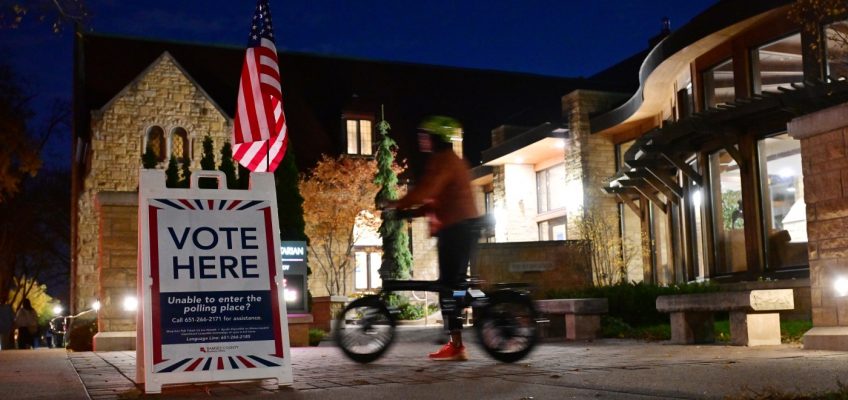St. Paul residents went to the polls in unexpectedly heavy numbers Tuesday to choose between re-electing St. Paul Mayor Melvin Carter to a third term in office or elevating one of four challengers to the role.
Among those challengers, the ranked-choice election included state Rep. Kaohly Her, who entered the mayor’s race in August with a strong following but a short lead time to make her case for overhauling leadership at City Hall.
Early returns showed Carter and Her virtually neck-and-neck, with just 11 of 86 precincts reporting and Her ahead by little more than a percentage point, or 100 votes.
While hand counts — St. Paul’s traditional method of determining the winner in an instant run-off election — can take days, results in the mayor’s race were expected late Tuesday night, thanks to new open-source software acquired by the capital city for the purpose of digitally reallocating ballots.
Carter and Her
Carter had said his progressive record — which ranges from forgiving library fines and making youth sports free at rec centers to creating college savings accounts for all of the city’s newborns — had never faltered despite riots, pandemic and heavy pushback from the Trump administration, and he asked voters for three more years to continue that agenda.
Her, who once served as Carter’s policy director, had criticized the mayor for what she described as a lack of general responsiveness to voters and prospective business owners. In light of the city’s fiscal challenges, she called into question whether the city should re-evaluate or hold off on several of the mayor’s Parks and Rec priorities, from a protected bikeway along Summit Avenue to a promenade overlooking the Mississippi River along Kellogg Boulevard.
“I’d like to see change,” said Ben McMahon, a Her supporter who voted at the Hillcrest Rec Center on Ford Parkway in Highland Park. “I went to the debate a few weeks ago, and they were hung up on the Summit Avenue bike lanes. There’s a lot more going on in the city than the bike lanes. Look at downtown — 40% of the office buildings are empty.”
Some voters have noted that on key issues, Carter and Her were well aligned. Both said they were “yes” votes on two ballot questions — a special school district levy and charter amendment — and Her has worked closely on several of the mayor’s top priorities, including a citywide $15 minimum wage and college savings accounts for newborns.
Audra Grigus, 26, said she would rank Carter first and Her second. Both candidates had similar platforms, she said, but Carter had done a good job overall of running the city over his two terms. She thought the challenge from Her would make the mayor better at his job over the next three years if he wins.
“This election cycle has pushed Carter,” she said.
Three other challengers were less politically experienced but had become increasingly visible over the course of the election season. Yan Chen, a University of Minnesota biophysicist, and Mike Hilborn, who owns a power washing company, both criticized the mayor’s record on property taxes and spending, and Adam Dullinger, a licensed professional engineer, had presented himself as the race’s strongest proponent for bikeways and public transportation.
Support for candidates
While the mayor lined up support from a majority of the city council, labor unions and progressive advocacy groups active in St. Paul elections like SEIU and Faith in Minnesota, Her drew the support of St. Paul Firefighters Local 21 and Teamsters Joint Council 32.
Some groups, like the St. Paul Area Chamber, had chosen to stay out of the race, with the chamber calling business growth stagnant both downtown and citywide. The St. Paul DFL, which is reconstituting itself, did not endorse a candidate.
The newly-elected mayor will serve three years, instead of four, as a result of the city’s switch to even-year elections in 2028.
St. Paul voters also found two questions on their ballot. The St. Paul School District sought a special 10-year levy equivalent to more than $1,000 per student, adjusted annually for inflation, and another ballot question asked whether to amend the city charter to allow for administrative citations, or civil fines for ordinance violations.
Higher-than-anticipated voter turnout caught some chief elections judges pleasantly off guard. Jeff Maas, head judge for Ward 3, Precinct 4 at the Hillcrest Rec Center on Ford Parkway, said the mayor’s race and the school levy question drew more voters than he had predicted to the polls.
Related Articles
The five-way St. Paul mayor’s race barrels toward a close on Election Day
Election Day is here. Here’s what you need to know.
St. Paul’s mayoral race to be decided by ranked-choice vote — on Election Night
Ramsey County elections: Races for mayor, city councils, school boards
Lefko, Young: We love St. Paul, and we worry about St. Paul
“We’ve had lines and we’ve had to snake lines,” said Maas, who oversaw a team of eight full-day volunteers, during a late afternoon lull. “I wish I had one more judge.”
About 59,000 voters — or 34% of the city’s 169,950 registered voters — cast ballots in 2021, when Carter handily won re-election in the eight way mayor’s race but a ballot question around rent control faced a less certain path to victory. Nearly 62,000 voters cast ballots in the 10-way mayor’s race in 2017, which reached nearly 40% voter turnout and elevated Carter, the city’s first Black mayor, into office.


Leave a Reply